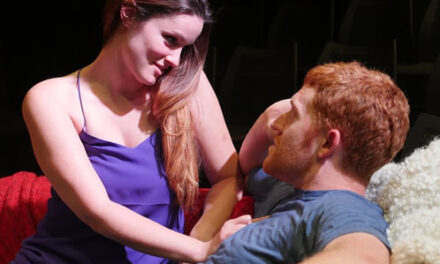Wind ensembles are the exact opposite of string ensembles. The latter seek a sublime blend of the four instruments, while the former play up the diversity of sounds of the component instruments. In this neck of the woods, people appear to prefer the creamy blend of strings. Or perhaps it was ACC basketball that kept some folks away from the Raleigh Chamber Music Guild’s Sunday afternoon concert. Whatever the reason, the absentees missed an unusual program, including works for various combinations of winds, piano and voice.
Musicians from Marlboro, a disparate chamber ensemble whose personnel changes in order to create the utmost flexibility in programming, brought a complete wind quintet – flutist Valérie Tessa Chermiset, oboist Rudolph Vrbsky, clarinetist Alexander Fiterstein, bassoonist Shinyee Na and Paul S. LaFollette III, horn – as well as veteran pianist Gilbert Kalish and soprano Hyunah Yu.
The program opened with Carl Nielsen’s Quintet, Op. 43, for winds, a work we always remember for its opening that sounds like “Dixie.” Although not a particularly profound work, its final movement, a theme and variations, is a marvelous showcase for the individual soloists as well as for particular pairings. It is an ideal work for emphasizing the diversity of sonorities and textures that is the specialty of wind ensembles. Unfortunately, a very musicianly performance was somewhat marred by moisture problems in LaFollette’s horn and Vrbsky’s particularly harsh and domineering reed.
Then came a series of four Schubert Lieder, sung with vocal beauty and passion by Yu. The four songs – “Das Rosenband,” “Ganymed,” “Heimliches Lieben” and “Der Hirt auf dem Felsen” – have particularly Romantic texts, so fraught with sentiment that they are difficult for modern singers to pull off and equally alien to modern audiences. Yu met the challenge admirably not only because she has a wonderful voice, but, more importantly, because she also was able to immerse herself so completely in the spirit of the songs. Kalish’s accompaniment was more restrained but allowed Yu to shine. There was a little more of a disconnect between Yu and Fiterstein, whose clarinet accompaniment to “The Shepherd on the Rock” conveyed a gentler, more subtle aura than Yu’s passionate shepherd, who sings the same notes. All in all, however, Yu is justifiably well on her way to a stunning career, and Fiterstein’s tone is so lovely that he was probably correct in not letting some maudlin poetry get in its way.
The second half of the program opened with another possible reason why attendance was sparse: the name Elliott Carter strikes fear and dread into the hearts of most audiences. Carter, whose particular brand of dense atonality is not everyone’s cup of tea, surprised and delighted us with “Eight Etudes and a Fantasy,” a neat and witty piece showcasing the flute, oboe, clarinet and bassoon. Carter wrote it in 1950 as a response to the failure of his students to write an effective piece illustrating the special characteristics of each woodwind instrument. Carter’s Etudes bring Bach to mind, with their canons – in diminution, augmentation, inversion, etc. Since they were designed to make a point with his students, some are frankly sarcastic – but to make a point, there is one etude consisting entirely of permutations of a major triad and another based on a single note that aptly demonstrates the different sonorities of the instruments. It was lots of fun to eat and not difficult to digest. And the playing was spectacular.
The final work on the program, Beethoven’s Quintet in E flat Major, Op. 16, for oboe, clarinet, bassoon, horn and piano, was something of a letdown. Composed, it is believed, as a response to Mozart’s K.452, a work in the same key for the same forces, it doesn’t begin to match the model for either thematic beauty or emotional intensity. Here again was an instance in which the exceptional playing of the group was attenuated by Vrbsky’s reed. While he blended well in soft passages, anything from mezzo forte up sounded raucous and drowned out the clarinet with which the oboe frequently partners. It was as if Vrbsky had chosen a reed for the contemporary pieces that just didn’t work with the more lyrical ones.
All in all, however, the program was a success. We sincerely hope that RCMG will continue to invite more ensembles with less regular instrument combinations and with innovative programming.












